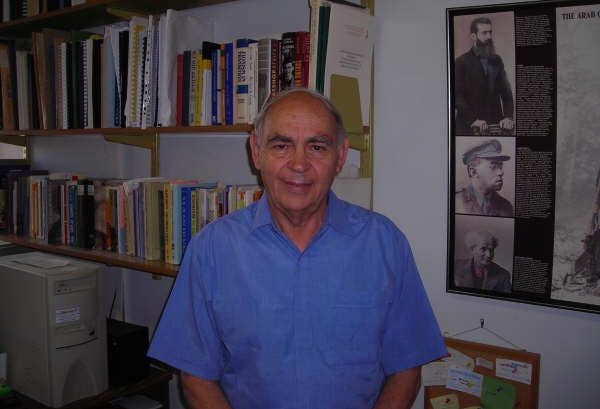
Featured Item

Shimoni questions assumptions of ‘Litvak DNA’
While our Lithuanian background forms the very basis of South African Jewish identity, a leading historian of South African Jewry, Gideon Shimoni, says the actual numbers of “Litvak” immigrants may be exaggerated.
“An accurate calculation of the Litvak-origin percentage of South African Jewry is evasive,” Shimoni said this week at a virtual conference hosted by the Kaplan Centre for Jewish Studies at the University of Cape Town and the University College London Institute of Jewish Studies titled “Jews in South Africa: New Directions in Research.”
“The truth is that the purported Litvak descent of South African Jewry has never been conclusively confirmed.”
He also questioned the assumption that the Jews who were disproportionally involved in the struggle against apartheid were motivated by Jewish values. “I found that attributing a formative influence to Judaic values is scarcely credible,” he said.
He was speaking at the opening session of the conference, which is intended as a springboard for a new generation of research on Jews in South Africa, according to the organisers.
Shimoni said he wasn’t implying that the current picture of Litvak heritage was badly distorted, and there was evidence that there was a prevalence of Litvak immigrants. “However, upon closer examination of the historical foundations of the community’s institutions, it becomes apparent that the description ‘a Litvak colony’ is an oversimplification.”
He attributed much of the confusion and uncertainty to the definition of what exactly ‘Litvak origin’ is. “This is because ‘Litvak’ identity isn’t clearly congruous with geo-political borders in Eastern Europe.”
He pointed out that, nowadays, people tend to attribute all the positive and unique qualities of South African Jewry to the community’s Litvak heritage.“The most significant of all the special qualities is the strength and cohesiveness of [the community’s] ethnic identity,” including “the extraordinary prevalence of Zionism in South African Jewry.”
However, in his research, he found that the explanation for this “lies more in the nature of South Africa’s societal environment than in the Litvak heritage”. Noting that Jews didn’t have a sense of belonging with the English, the Afrikaners, or a general South African identity, their Zionist and Jewish identities strengthened more here than in places like America, where “a new, overarching American identity exerted a powerful magnetism”.
Shimoni discussed how the foundations of the community were laid by Jews coming from England and Germany as well as Lithuania.
“Although prior to the outbreak of the Anglo Boer War, more than half of the estimated 24 000 Jews in South Africa were East Europeans, there were also about 7 000 Anglo-Jews and about 3 000 more who hailed originally from Germany, but who, in many cases, had lived in England for a time before coming to South Africa,” he said.
“They came during the 19th century, and it was they who established the institution of the organised community, not only before the East Europeans began to come, but also concurrently with their immigration waves. They had established the first congregation in Cape Town as far back as 1841, and even in the Transvaal, they were the founders and leaders of the main synagogue congregations. Most communal institutions were already in existence by 1910, and they bore the imprint of the Anglo-Jewish forms, rather than those of the Lithuanian shtetl.
“Thus, the pulpits of the major synagogues were occupied mainly by ministers trained in Britain. In the mother community of Cape Town, for example, this applied to the Reverend Philip Bender and in later years, Rabbi Israel Abrahams. Moreover, the mode of prayer in the major synagogues was modelled on the United Synagogue in London.”
What can be said with full confidence about a “Litvak stamp” on South African Jewry is that “a considerable percentage was of Litvak origin, but what percentage is not known exactly,” Shimoni said. Immigrants brought with them a strong ethnic and Zionist identity. “In addition, with ‘misnagdi orthodoxy’ [derived from the Vilna Gaon] being the dominant mode of religiosity in the Litvak region, they modified this into what can be characterised as ‘lightly-observant, if not non-observant, orthodoxy.’”
Shimoni isn’t convinced that the disproportionate involvement of Jews in the struggle was guided by Jewish values.
He found that, if anything, there is a conflicting relationship between Orthodox Jewish religiosity and liberal or radical convictions and actions. He explained that it was more likely that their choices were based on seeing themselves as “outsiders” in relation to the community or even their families, noting that “the autobiographical record of almost every Jew who became involved in the radical opposition in South Africa provides evidence of alienation”.
Professor Antony Polonsky, who took a radical stance as a student in the 1950s, responded to Shimoni’s presentation, saying this made sense in his experience. “Essentially, in my case it was a revolt against my parents, who were liberals,” he said.
“In our eyes, their liberalism was a higher form of paternalism [people in authority restricting the freedom of those subordinate to or dependent on them]. The way we saw it, was that it was a class problem, not a racial problem, and Jews had a role to play in uplifting the workers.”
Shimoni said that one factor that influenced Jewish radicals was a home environment where an East-European-born leftist spirit prevailed. “A secondary factor noticeable in the lives of some radicals was exposure to the Zionist youth movements, particularly Hashomer Hatzair.”
Anecdotally, he refers to an interaction with the late Chief Rabbi Cyril Harris, who battled with the idea that Jews in the struggle weren’t motivated by Jewish values, even if in a very indirect way. The professor said he found that “current collective memory isn’t receptive to my analysis and conclusions”.
“My intentions are regarded by some as an attempt to disparage Judaism. The truth is, as a strongly identifying Jew, I too would love to credit Judaism and so-called ‘Jewish values’ with a major role in motivating opposition to apartheid. But this isn’t borne out by the evidence.”
Because of these discrepancies between the “collective memory” of the community and historic research, Shimoni suggested that future research on South African Jewry should include “historical research on collective memory itself”.










